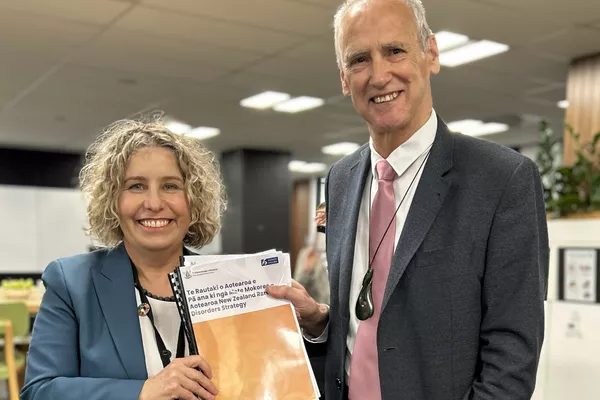Rare disorder community celebrates Aotearoa’s first Rare Disorders Strategy
25 Jul 2024
Today’s release of Aotearoa New Zealand’s first Rare Disorders Strategy marks a significant moment for people living with a rare disorder, their whānau, patient support groups and patient advocates who have been calling for this for decades.
“The significance of having an official Rare Disorders Strategy cannot be underestimated. This is huge for the rare disorder community, as it means first and foremost recognition and acknowledgement,” says Rare Disorders NZ Board Chair James McGoram.
“It marks the first time we have high level documented intention to improve the health and wellbeing of this vulnerable population group”.
For over 20 years Rare Disorders NZ, along with many other stakeholders in the rare disorder community has been calling for an official Rare Disorders Strategy to direct government entities on how to respond to rare disorder cases. Following a recommendation from the independent Pharmac Review in 2022, then Minister of Health, Andrew Little, announced that he had directed Manatū Hauora | Ministry of Health to develop a strategy for rare disorders.
After two years under development and with significant input from Rare Disorders NZ, the Strategy was finally released today.
“We are really pleased that the Strategy now puts people living with a rare disorder on the radar of policy makers. Their needs will finally be taken into consideration in future health system improvements and investments,” says Chief Executive of Rare Disorders NZ Chris Higgins.
There are over 7,000 known rare disorders, and while each rare disorder may only affect a small number of people in New Zealand, collectively rare disorders are estimated to affect 300,000 people in New Zealand.
Up until now the health system has had no directives on how to manage patients presenting with unusual co-presenting symptoms, leaving many patients feeling misunderstood and bounced around in the health system. Almost one in five rare patients reported waiting over 10 years for a diagnosis according to Rare Disorders NZ’s most recent survey, and over half reported feeling that communication and information exchange between different service providers was poor and that professionals are poorly prepared to support them.
Rare Disorders NZ, as the only umbrella organisation supporting all people and their whānau living with a rare disorder, has been closely involved in the development of the Strategy as a member of the Reference group. Their insistence that the Strategy should be informed by lived experience led to webinars being set up to ensure engagement with patients, support group leads and health professionals with expertise on rare disorders. Te Aka Whai Ora and Rare Disorders NZ also worked together to ensure the voice of whānau Māori living with a rare disorder was captured.
“The Strategy is not perfect and there are some significant omissions that we will need to continue to draw attention to, such as the need for a separate assessment pathway for rare medicines, and acknowledgment that rare disorders impact every aspect of life, not just health. But we believe the Strategy is a good foundation to start improving service delivery for people living with a rare disorder and we look forward to being part of the implementation process,” says Higgins.
“The Strategy is an important first step, but real change will only happen when systemic improvements are implemented, and we will certainly be monitoring this closely.”
Access the Rare Disorders Strategy here.


